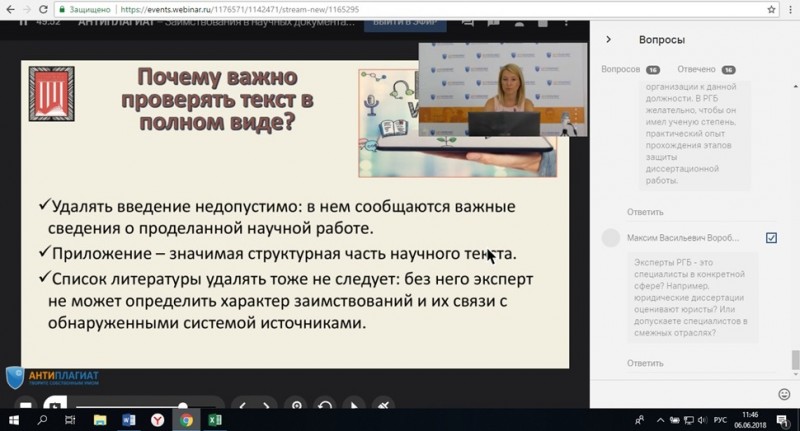Webinar “Plagiarisms in research documents. From the experience of the RSL specialists. Educational lecture”
08.06.2018
6 June 2018, there was held webinar “Plagiarisms in research documents. From the experience of the RSL specialists. Educational lecture.” The organizer of the event was the educational and methodological centre of the “Antiplagiat” company together with the Russian State Library (RSL). Nina V. Avdeeva, head of the Administrative department of management and monitoring service for clients of the RSL and head of the “Antiplagiat” project, was its speaker.
In order to make the coming event even more efficient, in April 2018 the specialists of the RSL and the “Antiplagiat” company had carried out a survey among the representatives of over fifty organizations (higher education institutions, research establishments and libraries). As a result there was revealed a range of urgent problems the possible solutions for which were offered in the course of the lecture.
|
Nina Avdeeva, webinar lecturer |
In her lecture Ms Avdeeva spoke on the topical issues connected with revealing plagiarisms in research documents with the help of the specialized software. She reported on the experience of the RSL specialists who had analyzed and evaluated texts of dissertation theses, author’s abstracts and other documents since the year of 2009.
The lecturer pointed out that the automated “Antiplagiat” system was no more than a tool for experts for identifying incorrect borrowings in text documents. The system just indicated the found overlapping fragments, while the expert’s task was to establish their character and make a conclusion whether the fact of plagiarism had taken place. Thus it would be not right to consider only the authenticity percent marked by the software. The computer check would just result in the data needing expert interpretation.
The aim of the expert work was exclusively in ascertaining facts of plagiarism being revealed or not in this or that document tested.
Among the advantages of the expert test carried out at the RSL there could be named their independence, impartiality and objectivity.
Over the whole course of the lecture Nina Avdeeva was explaining the web audience the criteria helping to evaluate the coincident text fragments in order to make a decision whether they were plagiaristic or not.
Within the framework of the webinar there were given details concerning the rules of arrangement of quotations, references and bibliography lists. Another aspect to be highlighted was the problem of quotation volumes, of paraphrase and of compilation as phenomena. The speaker would also explain how those techniques being applied could influence the decision on authenticity of the text.
237 remote listeners of diverse places of Russia followed the webinar online. And their work was in this or that way connected with preparing research documents and testing them for plagiarism, too. The specially organized rubric and the chat received a lot of questions and held discussions on relevant themes. The remote participants of the webinar were having their questions answered by the RSL specialists.
In conclusion of the event the participants of the webinar thanked Nina Avdeeva for the informative speech and received knowledge.
You are welcome to view our video over here: https://youtu.be/VqACnT_cjVU.
Downloading presentation is available over here: “Plagiarisms in research documents. From the experience of the RSL specialists. Educational lecture”.


 Virtual Keyboard
Virtual Keyboard
 по-русски
по-русски


